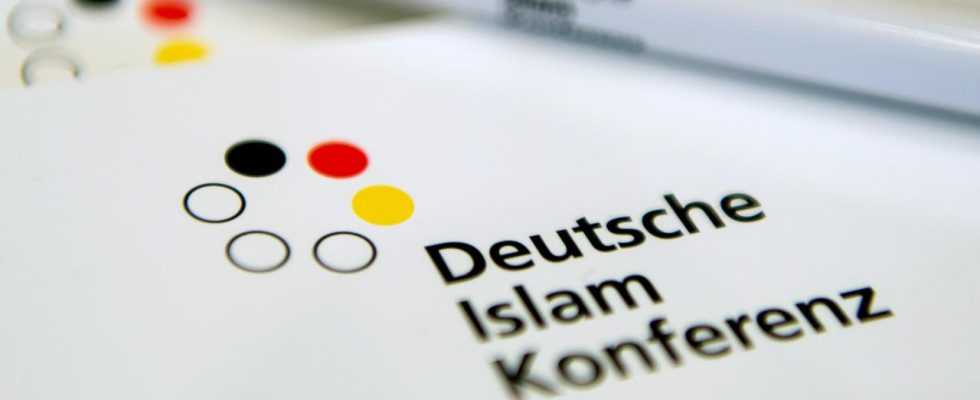The Ministry of the Interior has been inviting dialogue about Islam in various formats for 17 years. This year the dispute starts with the program.
In October, migration researcher Ruud Koopmans receives an invitation to the German Islamic Conference. The planned topic: anti-Muslim sentiment. The Federal Ministry of the Interior asked him whether he wanted to take part in a discussion in this context. The letter is dated October 20, 2023. Ruud Koopmans refuses.
The Islamic Conference was launched in 2006 by the then Interior Minister Wolfgang Schäuble. The thematic focus at the beginning was security issues. That has changed over the years. Most recently it was about religious education in schools, Islamic welfare, pastoral care in prisons and in the military, the problem of state-appointed imams – and anti-Muslim sentiment.
In the summer, an independent group of experts convened by the ministry presented a report on the topic – with 15 recommendations for action to the federal government. That’s what this year’s Islamic conference was supposed to be about. But then the terrorist organization Hamas attacked Israel on October 7th, and anti-Semitic crimes subsequently occurred during pro-Palestinian demonstrations in Germany.
Migration researcher: Topic “inappropriate”
Migration researcher Koopmans replied to the ministry that he considered the timing of the conference topic to be “unfavorable”, “if not even inappropriate”. “We are currently not living in times in which anti-Muslim sentiment appears to be the central problem.” Rather, one can experience how attacks on Jews and Israel are made at demonstrations with predominantly Muslim participants. “Simply ‘Keep it up’, especially when it comes to the topic of anti-Muslim sentiment, seems to me to be sending completely the wrong signal at the moment.”
Seyran Ates, founder of a liberal mosque in Berlin, also criticizes the choice of topic. “We currently have more important things to discuss than anti-Muslim sentiment.” We need to talk about political Islam, anti-Semitism and intra-Muslim conflicts. “And the question of which Islam can survive in Germany for the next few decades. How do we manage to establish a pluralistic Islam in Germany. That is the main question.”
Liberal Muslim: Air is getting thin
Ateş represents liberal Islam. She doesn’t wear a headscarf. Your mosque is expressly aimed at queer people. She has long criticized the Islamic Conference. Nevertheless, she continued to take part. She wants to go again this year. Even if their expectations are “absolutely zero”. “From day one, people like me were only invited as a fig leaf,” Ates accuses the Interior Ministry.
The main criticism over the years has been who the government sat down at the table with. These were primarily the large conservative Islamic associations – such as the Central Council of Muslims, the German-Turkish mosque association Ditib and the Islam Council.
“German politics continues to only focus on the associations,” says Ates. The air for liberal Muslims is becoming thin in Germany. “German politicians don’t want us to gain a foothold here in Germany with liberal Islam.”
Extremism expert: “Lame” start
Extremism expert Ahmad Mansour has been following the Islamic Conference for several years. “In 2018, a lot of different people came together at the Islamic Conference. There was a real debate that the country needs,” he says. Interior Minister Nancy Faeser’s opening event last year, however, was “lame”. “There wasn’t much interaction. Only the comfortable ones were invited.”
In addition, Faeser dissolved the Political Islam Expert Group. “That would be extremely necessary now.” The expert group was set up by the Federal Ministry of the Interior in June 2021 to develop recommendations for action on how to deal with Islamist groups. After the change of government it was not continued.
Islamrat: Event is passing us by
This time the Ministry of the Interior has invited Muslims and their representatives, actors from Jewish life, politics, the church, civil society and science.
Last time the Central Council of Muslims was also there. The association was recently accused of not clearly condemning the attack on Israel. This time he is not invited.
The three planned discussion rounds are primarily made up of experts from science and administration. Only one representative of an Islamic association – the Maliki Community Alliance – sat on the podium on the second day of the event.
“We see that an event is currently taking place that deals with anti-Semitism and anti-Muslim hostility and none of the major associations are on the podium or were included in the preparation,” says Burhan Kesici, chairman of the Islamic Council. The event is bypassing the Muslims. “There is always a requirement that Muslim associations should actively participate, but how can you do that if you are just a spectator, so to speak.”
Ministry changes program
The Ministry of the Interior has since changed the program – making anti-Semitism an issue alongside anti-Muslim sentiment. Mathias Rohe, who coordinated the Independent Expert Group on Muslimphobia and has been observing the Islamic Conference since its beginnings, says he fully understands that the issue of anti-Semitism must now be put on the table. But it is important not to play things off against each other. “The problems add up,” he says. “You have to tackle anti-Muslim hostility and anti-Semitism.”
Ulrich Pick, SWR, tagesschau, November 20, 2023 11:44 p.m

